Janice Hardy's Blog, page 63
October 4, 2019
NaNoWriMo Prep: Get Ready to NaNo Your Novel
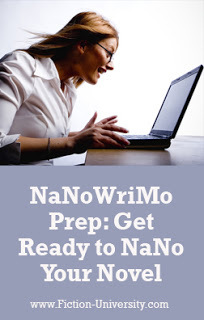 By Janice Hardy, @Janice_Hardy
By Janice Hardy, @Janice_HardyBefore I dive into to today's article, here's a heads up that I'm over at Writers in the Storm today talking about Getting Lost: When Your Plot Hides Behind the Details. Come on over and say hello.
It's that time of year again!
Writers all over the world are gearing up for NaNoWriMo (National Novel Writing Month), so it's time to break out the ol'prep guides from the archives for those about to dive into the writing frenzy.
If you're not doing NaNo, this is a good overview of what goes into a novel, so you'll find some helpful tips on novel writing as well.
And if you're looking for a handy guide to the whole novel-planning process, I suggest taking a peek of my book, Plotting Your Novel: Ideas and Structure, with ten self-guided workshops and over 100 exercises designed to guide you from idea to a workable outline and synopsis.
If you decided to do NaNo, I gather you already have an inkling of the novel you want to write. If you don’t, then I’d suggest starting with this article for some brainstorming ideas or looking at the bigger story picture here before diving into today’s article.
Ready? Okay, let's go!
Continue ReadingWritten by Janice Hardy. Fiction-University.com
Published on October 04, 2019 03:00
October 3, 2019
Break out of the Box and Escape the Rut: Tips to Boost Your Creativity
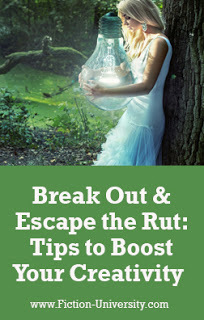 By Shanna Swendson, @ShannaSwendson
By Shanna Swendson, @ShannaSwendsonPart of The Writer’s Life Series
JH: You can't keep up with your creative output without receiving creative input. Refilling the well matters. This month, Shanna Swendson shares another batch of tips on boosting your creativity.
Shanna Swendson earned a journalism degree from the University of Texas but decided it was more fun to make up the people she wrote about and became a novelist. She’s written a number of fantasy novels for teens and adults, including the Enchanted, Inc. series and the Rebel Mechanics series. She devotes her spare time to reading, knitting, and music.
Website | Twitter | Facebook | Goodreads
Take it away Shanna…
Continue ReadingWritten by Janice Hardy. Fiction-University.com
Published on October 03, 2019 03:00
October 2, 2019
Learn the Keys to Writing Powerful Fiction from the Best Storytellers in The Field
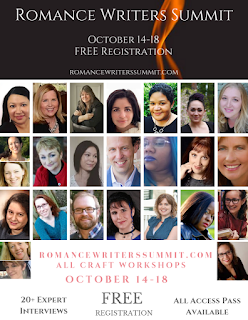 By Janice Hardy, @Janice_Hardy
By Janice Hardy, @Janice_Hardy Have you heard about the Romance Writers Summit? It’s like attending an amazing writer’s conference without ever leaving your house. Kris Kennedy has brought together quite the collection of authors, editors, screenwriters, and even game writers, and sat down with every one of them to ask questions writers want answers to.
It might say “Romance Summit” on the door, but these sessions offer writers of all genres advice they can use.
Over twenty speakers will share their knowledge and expertise with interviews and sessions filled with helpful advice.
One of them is me! I had an info-packed interview session with Kris on Writing Opening Scenes that Grab the Reader. And for you pantsers out there…you’ll also find the always amazing Jami Gold sharing her Romance by The Beats workshop (and the full list of speakers is fantastic, so check it out). You’ll also hear from:
Internationally best-selling author Brad Parks on Adding Thrills & Suspense & Tension The “won just about every science fiction and fantasy award they offer” Rebecca Roanhorse on Character- and World-Building NY Times, Wall Street Journal, and USA Today bestselling author Marie Force on Writing Series That’s only five of the twenty-two speakers at this thing. And did I mention you don’t even have to leave the house? And if you register now, you also get this extra free goodie: A mini-ebook covering three vital keys to crafting powerful, page-turning, fan-building romance fiction.
Continue ReadingWritten by Janice Hardy. Fiction-University.com
Published on October 02, 2019 08:29
Give Your Readers Someone to Hate
 By Janice Hardy, @Janice_Hardy
By Janice Hardy, @Janice_HardySometimes, your novel needs a character readers love to hate.
Last week, Literary Rambles posted a great article about why we need unlikable characters that reminded me of a conversation my husband and I once had.
We were watching Downton Abby and remarking on how much we disliked the characters of Thomas and O’Brien. But if the show got rid of them, then there’d be no one to hate, and we’d focus our dislike on the next least-likable character (looking at you, Mary).
After some discussion, we realized this was common across many shows and even books, both with us, and family and friends.
In order to have a hero, a story needs a villain.
Continue ReadingWritten by Janice Hardy. Fiction-University.com
Published on October 02, 2019 03:00
October 1, 2019
How to Write a Real Page-Turner, Part 4
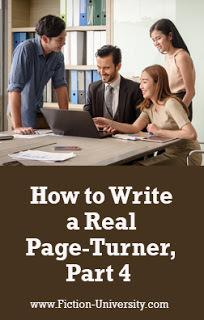 By Laurisa White Reyes, @lwreyes
By Laurisa White Reyes, @lwreyesPart of the How They Do It Series
JH: Once again, Laurisa White Reyes is back at the podium with her How to Write a Page-Turner series, this time talking about multiple point of view.
Laurisa White Reyes is the Senior Editor of Skyrocket Press & Author Services. She has published sixteen books, including 8 Secrets to Successful Self-Publishing and the SCBWI Spark Award winner The Storytellers . Laurisa also provides personal coaching for writers. To connect with her, visit Skyrocket Press.
Website | Facebook | Twitter | Goodreads |
Take it away Laurisa...
Continue ReadingWritten by Janice Hardy. Fiction-University.com
Published on October 01, 2019 03:00
September 30, 2019
Why Your Plot Isn’t Working
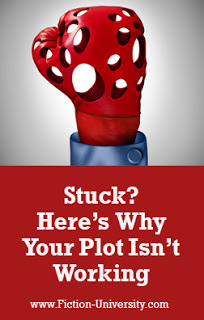 By Janice Hardy, @Janice_Hardy
By Janice Hardy, @Janice_Hardy At the heart of every novel is a problem to solve. When the novel has no problem, you’ll have a problem plotting it.
One of the first novels I tried to write “for real” (one I intended to submit to agents and hopefully get published one day), suffered from me not knowing what my novel was truly about. I had a general sense of what the main problem was—save the world—but I never fully understood what that meant to the plot.
I knew the characters all had issues to face and problems to solve, and I knew the details of every one of them. I knew they’d all converge at a particular point in the point in the book and have a massive battle. I even knew specific details about how some of those epic fights would go down.
What I didn’t know, was what my villain wanted, why it mattered, and what he’d planned to do about it. Not on any real level anyway. He wanted to take over the world because he was a bad guy and that’s what bad guys did. I decided what “evil step of his plan” my characters encountered as I outlined the story and had to give them scene goals, with no regard to a larger plot beyond “stopping the bad guy from taking over the world.”
Continue ReadingWritten by Janice Hardy. Fiction-University.com
Published on September 30, 2019 06:17
September 29, 2019
Sunday Writing Tip: Check for Cardboard Conflict
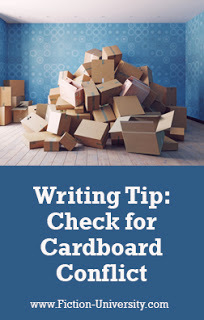 By Janice Hardy, @Janice_Hardy
By Janice Hardy, @Janice_Hardy Each week, I’ll offer a tip you can take and apply to your WIP to help improve it. They’ll be easy to do and shouldn’t take long, so they’ll be tips you can do without taking up your Sunday. Though I do reserve the right to offer a good tip now and then that will take longer—but only because it would apply to the entire manuscript.
This week, examine your novel’s conflicts and make sure they’re not flimsy as paper.
“Your scene needs conflict” is something writers hear all the time, and while it’s true, it’s also easy to throw in a conflict just to have one. Problem is, that conflict doesn’t serve the story or accomplish the things a good scene conflict is supposed to do.
Check your scenes for conflict, but also really look at each conflict. Is it something that’s truly a problem to overcome that will affect the story, plot, or character in some way, or is it simply a flimsy obstacle that lets you say, “Yes, there’s conflict here?”
Continue ReadingWritten by Janice Hardy. Fiction-University.com
Published on September 29, 2019 05:31
September 28, 2019
Real Life Diagnostics: Handling Too Many Details in a Query Letter
 Critique By Janice Hardy, @Janice_Hardy
Critique By Janice Hardy, @Janice_HardyReal Life Diagnostics is a weekly column that studies a snippet of a work in progress for specific issues. Readers are encouraged to send in work with questions, and we diagnose it on the site. It’s part critique, part example, and designed to help the submitter as well as anyone else having a similar problem.
If you're interested in submitting to Real Life Diagnostics, please check out these guidelines.
Submissions currently in the queue: Two
Please Note: As of today, RLD slots are booked through October 12.
This week’s question:
I feel like the last paragraph needs more development, but I don't want to bog the query down with details.
Market/Genre: Query Letter
On to the diagnosis…
Continue ReadingWritten by Janice Hardy. Fiction-University.com
Published on September 28, 2019 06:22
September 27, 2019
Why Your Character (and You) Should be an Expert in Something
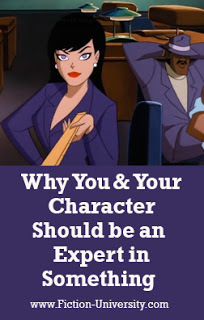 By Alyssa Hollingsworth
By Alyssa Hollingsworth Part of the How They Do It Series
JH: Readers remember (and usually like) characters who are good at things, so it’s worth taking the time to discover where your protagonist had mad skills. Alyssa Hollingsworth visits the lecture hall today to share tips and thoughts on making you and your character and expert.
Alyssa was born in small-town Milton, Florida, but life as a roving military kid soon mellowed her (unintelligibly strong) Southern accent. Wanderlust is in her blood, and she's always waiting for the wind to change. Stories remain her constant.
She got her BA in English with an emphasis in Creative Writing from Berry College and my MA with honors in Writing for Young People at Bath Spa University. She’ll happily talk your ear off about either of these programs — they both rocked!
The Eleventh Trade was her debut novel with Roaring Brook/Macmillan (U.S.) and Piccadilly Press (U.K.), as well as a handful of other foreign publishers. Her second book The Invisible Boy comes out Summer 2020.
Website | Goodreads | Pinterest | Instagram
Take it away Alyssa…
Continue ReadingWritten by Janice Hardy. Fiction-University.com
Published on September 27, 2019 07:09
Here’s the Pitch—It’s a Hit! Crafting Your Novel's Pitch Line

By Janice Hardy, @Janice_Hardy
This week's Refresher Friday takes an updated look at an old favorite--writing a great pitch for your novel. Enjoy!
Pitching your novel makes most writers cringe, but it's actually one of the first things we learn to do. Telling someone what our story is about happens even before we write it. A pitch is just a more professional version of that.
I’ve chatted about pitches before, so let’s cover some new ground today.
A pitch means several things (the terminology is used interchangeably), so let's clarify what I mean first.
A one-line pitch is the elevator pitch. It's what you say when someone asks "what's your book about?" A pitch paragraph is the entire description of the novel (and the bulk of your query). A query hook is the same thing. I'm talking about one-lines pitches in this article. They can be either spoken or written.
Now let’s look at what makes a good one-line pitch.
Continue ReadingWritten by Janice Hardy. Fiction-University.com
Published on September 27, 2019 03:27



